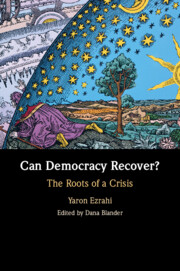Book contents
- Can Democracy Recover?
- Can Democracy Recover?
- Copyright page
- Dedication
- Contents
- Preface
- Words from the Author
- Introduction
- Part I The Rise of Western Politics following the Collapse of the Monistic Medieval Cosmology
- Part II The Emergence of the Epistemological Constitution of Modern Democracy
- Part III The Dialectics of Objectification
- Part IV The Erosion of the Epistemological Constitution of Modern Democracy
- 12 The Political Disempowerment of the Modern Democratic Citizen
- 13 The Elusiveness of Political Causality
- 14 The Loss of Self-Evident Public Facts and the Crisis of the Commonsense Conceptions of Reality
- 15 The Decay of the Epistemological Norm of Political Visibility
- 16 The Fall of Objectivity and Objectification
- Part V Democracy beyond Modernity
- Can Democracy Recover? Concluding Reflections
- Epilogue
- Index
16 - The Fall of Objectivity and Objectification
from Part IV - The Erosion of the Epistemological Constitution of Modern Democracy
Published online by Cambridge University Press: 02 January 2025
- Can Democracy Recover?
- Can Democracy Recover?
- Copyright page
- Dedication
- Contents
- Preface
- Words from the Author
- Introduction
- Part I The Rise of Western Politics following the Collapse of the Monistic Medieval Cosmology
- Part II The Emergence of the Epistemological Constitution of Modern Democracy
- Part III The Dialectics of Objectification
- Part IV The Erosion of the Epistemological Constitution of Modern Democracy
- 12 The Political Disempowerment of the Modern Democratic Citizen
- 13 The Elusiveness of Political Causality
- 14 The Loss of Self-Evident Public Facts and the Crisis of the Commonsense Conceptions of Reality
- 15 The Decay of the Epistemological Norm of Political Visibility
- 16 The Fall of Objectivity and Objectification
- Part V Democracy beyond Modernity
- Can Democracy Recover? Concluding Reflections
- Epilogue
- Index
Summary
In this chapter, Ezrahi argues that the massive discrediting of claims of objectivity has deeply weakened the social authority of professional communities and institutions – governments, scientists, and economists – which have heavily resorted to professionalism in order to seemingly depoliticize decisions and empower their legitimacy. The dual role of objectivity norms and objectification strategies in depoliticizing decisions while concealing value-political choices is scrutinized. The delicate balance between overpoliticization and over-objectification is examined, emphasizing the challenges faced by governments in navigating transparency and political functionality. The chapter traces the interconnected erosion of the transcendental concept of Nature, democratic culture, and the rule of law. The loss of objectivity in law, exemplified by challenges to the Israeli Supreme Court, underscores the broader decline in civic solidarity. The chapter concludes with an exploration of the cultural and epistemological crises facing modern democracy, raising critical questions about resources available for shaping new imaginaries of self-governance and justice, drawing on historical cosmological transformations.
Keywords
- Type
- Chapter
- Information
- Can Democracy Recover?The Roots of a Crisis, pp. 153 - 158Publisher: Cambridge University PressPrint publication year: 2025

